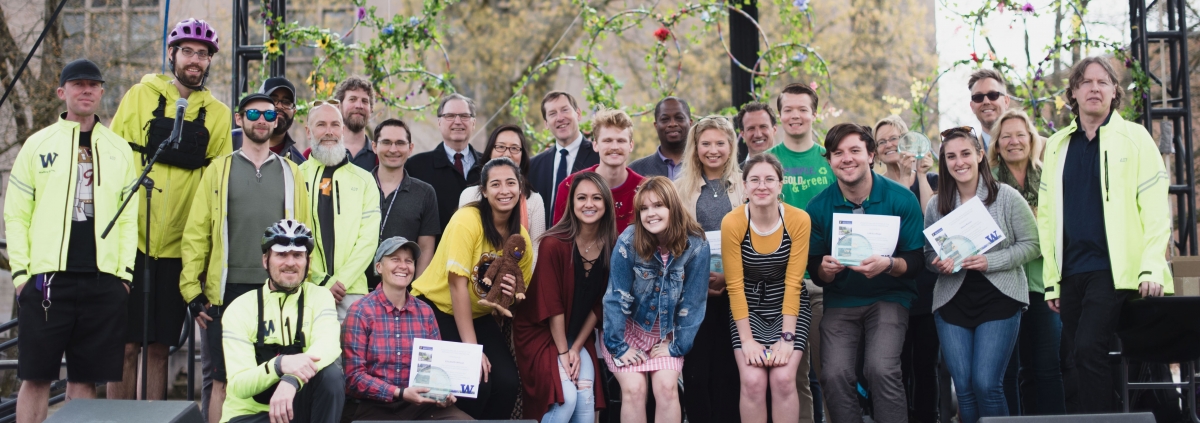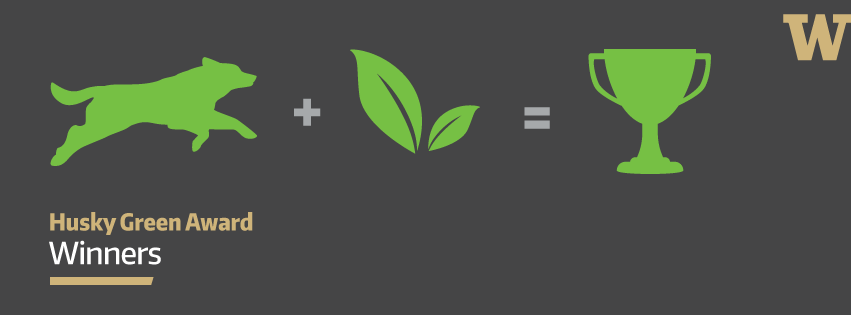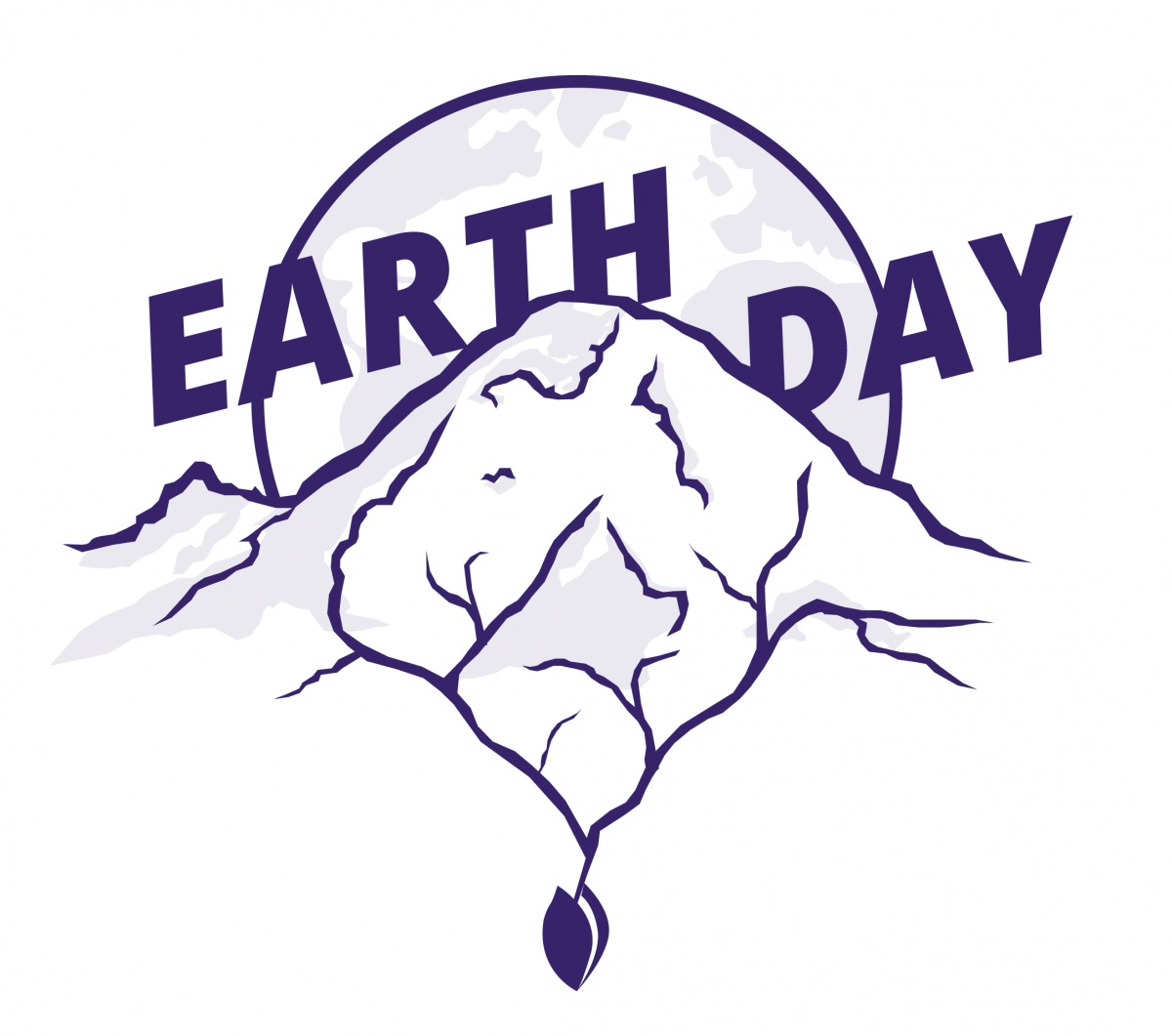The UW is officially the first campus in the country to implement an electric bicycle mailing services fleet. This innovative program led by the Mailing Services team has successfully reduced greenhouse gas emissions, costs and vehicle traffic, all while making deliveries more efficient. A grant from the Campus Sustainability Fund in spring of 2017 provided the initial kick start to develop the program. The team looks forward to expanding their e-bike delivery to other locations including the UW Research buildings in South Lake Union and Husky Stadium.

The Husky Green Awards celebrated their ninth year of recognizing sustainability leadership at the University of Washington. The 2018 award ceremony was held during the 2018 Earth Day celebration in Red Square. The Husky Green Awards are given annually to students, faculty and staff from the Seattle, Bothell and Tacoma campuses who show environmental leadership and dedication. See all the 2018 Husky Green Award recipients below, or see the full list of the 2018 nominees.

Livable City Year
The UW Livable City Year program (LCY) engages UW students and faculty across all three campuses in cross-collaborative projects to develop sustainable solutions to real-life problems in a partner community. The program partnered with Auburn for the inaugural year in 2016-2017, and is working with the city of Tacoma for 2017-2018. The scope of the program has nearly doubled in its second year, and has given hundreds of students direct experience working on issues around sustainability and livability in local communities. LCY also provides partner cities with work that is used to improve the lives of residents. The LCY program has given hands-on experience to students to serve and learn from community members, and build a sustainable future for participating cities.
Read moreUW EcoReps
EcoReps has played an innovative and critical role in promoting environmental awareness on campus as one of the leading student clubs engaged in sustainability. Various projects include organizing regular Husky Green Markets on Red Square to support local producers, and the implementation of the Green Dawgs Certification Program which assesses and helps student clubs reduce their environmental impact. EcoReps has also worked hard to advocate sustainability across multiple disciplines from the arts to medicine with programs like Sustainability in the Arts Initiative (SITA) and Greening Health Sciences.
UW Resource Conservation Program
The UW Facilities Services' Energy Resource Conservation team has taken large steps over the past year to prioritize sustainability on our campus. They have conducted energy audits for 12 million square feet on campus and generated revenue through reducing the campus’s energy needs and utility savings. In 2013 to 2017 alone, the program avoided 2,372 MgC02e and saved $5,660,593 in utility costs. This program has played a critical role in meeting UW’s Climate Action Plan goals while also reducing costs.
Alexa Russo
As UW Bothell’s student sustainability assistant, Alexa went above and beyond her expected duties within the office. She manages all communication platforms that connect the UW Bothell Sustainability office to the campus community, founded the Sustainability Educators Program, and played a key role in coordinating this year and last year’s Earth Week at UWB. Her dedication to promoting and increasing awareness on campus has been evident over the past two years within and outside the office, and this March Alexa graduated from the student assistant position to being named the Interim Sustainability Coordinator at UW Bothell.
Amy Lambert
Amy is a lecturer in UW Bothell’s School of Interdisciplinary Arts and Science and a visual artist. She is passionate about species-level conservation biology and plant community restoration, and deeply believes in student collaboration in classes. Amy has also contributed to developing the CCUWBee Research Initiative and restores pollinator populations in the Puget Sound area in her free time. She has become an inspiration for many young women pursuing science related fields with her passion, resilience, and commitment to breaking gender stereotypes in the community.
Devin Kleiner
Devin Kleiner, faculty, Built Environments
Devin is a Project Architect at Perkins+Will Seattle, a global architecture firm focused on sustainable design, and a visiting lecturer for the UW Architecture Department. His contributions as a teacher have challenged and inspired students to assess how design and architecture can help shape a sustainable future. In his role as project architect with Perkins+Will, he has worked to incorporate sustainable features in new buildings, including championing the innovative solar fins on the Life Sciences Building. His interdisciplinary approach to addressing and solving today’s complex issues have inspired his peers and students to find new solutions for a sustainable future through their own varied talents.
Eli Wheat
Eli is a lecturer in the Program of the Environment and a 2010 recipient of the UW's Excellence in Teaching Award. He is known as an enthusiastic and passionate teacher who inspires students to implement sustainable habits into their daily lives and also into their future careers. His drive to increase awareness around sustainable food played a large role in establishing the UW Farm. In addition to his contributions on campus, he also operates SkyRoot Farms, a 20-acre farm on south Whidbey Island that has become a source of inspiration for the community.
Frieda Luoma-Cohan
Frieda has played an instrumental role as a community leader of various student-led initiatives around campus including the Student Association for Greener Environments (SAGE), and the Program on the Environment's Sustainable Learning Space. Frieda's contributions to SAGE include coordinating recycling efforts at Husky football games, which have paid off as UW football reached its highest-ever diversion rate during the 2017 season. She has also become the official steward of the Sustainable Learning Space, a plot between the Fisheries building and Wallace Hall that used to be infested by invasive species that have now been restored as a community space. Her commitment to continually improving the plot with native plantings, enhanced trail construction, and other intensive maintenance projects, has allowed for this learning space to be enjoyed by many.
Henry Milander
Henry is an active advocate and leader of sustainability efforts within the Foster School of Business as the president of the Certificate of International Studies in Business (CISB) and the Rotaract Club. His prominent contributions to the community include leading the planning committee for the inaugural Global Leadership Forum, co-founding the Foster School's Global Health Business Case Competition, and incorporating CSR and sustainability programs into CISB. Such important work highlights the importance between the intersection of ethics, sustainability, and international business. Henry has paved an important path for current and future students to engage themselves in curriculum and programs that push them to think critically about their roles as future business leaders within a rapidly changing world.
James Gawel
As an Associate Professor of Environmental Chemistry and Engineering in UW Tacoma’s School of Interdisciplinary Arts & Sciences, James teaches courses on environmental chemistry, pollution and public policy, and limnology. Outside of the classroom, he organizes Puyallup Watershed Initiative’s yearly documentary competition to raise awareness about preserving the watershed, mentors for the student-led Project Earth, and is regarded as a regional expert on freshwater lakes. His passion for sustainability and dedication to collaborating with students is highly regarded throughout the community, and he has previously received a Husky Green Award in 2010 along with other various teaching nominations and awards.
Stanley Joshua
Stanley is the Director of Facilities Services for the UW Tacoma campus and an avid advocate for sustainable projects in the community. Several key undertakings that he has been a part of include leading a sustainable design class, collaborating with students on the EPA Campus RainWorks Challenge, and implementing energy efficient lighting and Cedar Grove composting programs on campus. He actively involves students in all his projects and has attended the last two regional Sustainability in Higher Education Conferences to bring back new programs to campus.
Husky Green Legacy winner: John Schaufelberger
John Schaufelberger has served on the UW's Environmental Stewardship Committee (ESC) since its inception in 2005. He guided the building and energy policy included in the UW's Climate Action Plan and is currently serving on the ESC's Green Building Standards sub-commitee. He has been at UW since 1994, and has served as the dean of the College of Built Environments since 2013. In this role he has been a strong supporter of the University’s sustainability efforts. He has been a champion for many UW sustainability efforts, including the creation of the Livable City Year program, UW's signing on to the White House pledge for resilient design and student projects such as the Living Green Wall on Gould Hall.
Husky Green Legacy winner: Ruth Johnston
Over the past ten-plus years, Ruth Johnston has been a champion for environmental sustainability at the UW. In 2008, Ruth accepted the charge from UW’s then-president and SVP Mark Emmert and V’Ella Warren to develop a Climate Action Plan. For nearly a year, she led planning meetings with faculty, students and staff, facilitated charrettes, read and edited drafts, and presented to senior leaders and the Board of Regents. This work culminated with the publication in 2009 of UW’s Climate Action Plan, and its subsequent updates. Ruth also led the efforts to document and publish the Executive Order on Sustainability (2012), the Marginal Abatement Cost Curve (2013) and UW’s server policy (2014)—all supporting efforts in the UW’s path to reducing carbon emissions. Ruth has vigorously supported cross-university efforts and communications, such as the Environmental Stewardship Committee, the Climate Action Plan policy sub-committee, and research into encouraging an increase in sustainability in UW’s curriculum.
As Associate Vice President of Strategy Management, Ruth led UW Sustainability from a half-time administrative position to a thriving office dedicated to supporting and leading students, faculty and staff in the sustainability journey, including launch of a vibrant website and the UW achieving Gold status in STARS reporting. In addition to her busy work schedule, she regularly reports on UW’s progress at national conferences such as NACUBO and WACUBO. Her latest assignment has taken her to UW Bothell, where she is the Vice Chancellor of Planning & Administration and continues to champion sustainability efforts.














